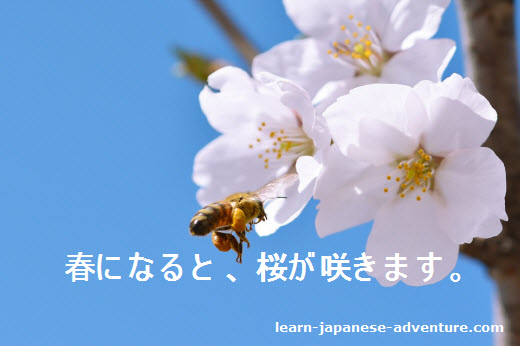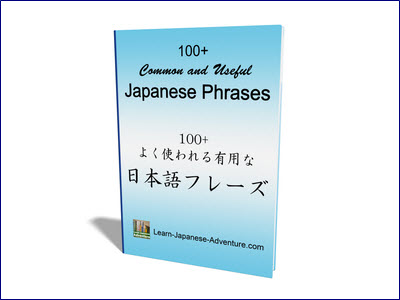- Home
- Intermediate Lessons
- Japanese Conditional Form と (to)
Japanese Conditional Form -
Part 1. ~と (~to) Sentence -
Intermediate Lessons: 24
In this lesson and the following few lessons, you will get to learn the Japanese conditional form, which is considered to be one of the most difficult topic in Japanese language.

In English, you can normally use the pair of words "if~ then~" for almost all conditional sentences - "If something happens, then something happens".
However, in Japanese you need to change to different conditional forms depending on the situation.
These Japanese conditional forms include と (to), ても (temo), ば (ba), なら (nara) and たら (tara) sentences. They are all different, though they all translate to "if" in English.
In order to understand how to use all of them, the most important thing is to remember which conditional form to use during each specific situation.
In this way, you won't be confused about using the wrong conditional form.
Sentence Patterns
Let's get started with the first conditional form と (to) sentence and study the sentence patterns...
| Sentence 1 (Plain-form) | と、 | Sentence 2 |
| Affirmative | ||
| Verb (Dictionary-form) | と、 | Sentence 2 |
| い-Adj (~い) | と、 | Sentence 2 |
| な-Adj だ | と、 | Sentence 2 |
| Noun だ | と、 | Sentence 2 |
| Negative | ||
| Verb (ない-form) | と、 | Sentence 2 |
| い-Adj (~ |
と、 | Sentence 2 |
| な-Adj でない | と、 | Sentence 2 |
| Noun でない | と、 | Sentence 2 |
Note 1: For と sentence, sentence structure is always in present tense. That means Sentence 1 and Sentence 2 are always in present tense, no past tense.
Note 2: For negative な-Adj and Noun sentence, use でない (denai) instead of ではない (dewanai).
In the above sentence patterns, the left hand sides are the conditions, the right hand sides are what happen next when the conditions are fulfilled.
Examples of と (to) Sentence
Let's check out some examples (Affirmative) to see how to use the Japanese conditional form と sentence...
|
1. |
電気をつけると、明るくなります。 |
|
2. |
春になると、桜が咲きます。 |
|
3. |
2と3を足すと、5になります。 |
|
4. |
暑いと、喉が渇きます。 |
|
5. |
静かだと、よく眠れます。 |
|
6. |
20歳以上だと、日本ではお酒が飲めます。 |
Let's take a look at some examples which make use of Negative forms...
|
1. |
夜電気をつけないと、暗いです。 |
|
2. |
雪が降らないと、スキーができません。 |
|
3. |
何も食べないと、痩せます。 |
|
4. |
背が高くないと、モデルになれません。 |
|
5. |
静かでないと、よく眠れません。 |
|
6. |
いい天気でないと、遠くの山が見えません。 |
Rules of Using the Japanese Conditional Form と (to) Sentence
From the above examples, you will notice that...
と (to) sentence expresses Sentence 2 inevitably as a result of Sentence 1. It means whenever the condition in Sentence 1 is set, result in Sentence 2 will always happen. Therefore expressions used in Sentence 2 are natural and predictable events/states or unavoidable facts.
Based on the above 'rules', と (to) sentence is mainly used in the following 3 types of sentences...
- Nature-related Fact
- Use of Machine
- Give Direction
Note: Expressions of one's will, hope, judgement, permission, order, invitation or request, etc cannot be used in Sentence 2.
1. Nature-related Fact
In one of the above examples...
- 春になると、桜が咲きます。
haru ni naru to, sakura ga sakimasu
Meaning: If Spring comes, the cherry blossom will bloom.
...it's a nature-related fact we know that "If Spring comes, the cherry blossom will bloom". The cherry blossom will not bloom in Summer, Autumn and Winter.
Another example on nature-related fact...
- 祖父は眼鏡をかけないと、新聞が読めません。
sofu wa megane wo kakenai to, shinbun ga yomemasen
Meaning: If my grandfather does not wear glasses, he can't read the newspaper.
2. Use of Machine
When you use the train ticketing machine, if you press the button of the 200 yen ticket after inserting the money, the 200 yen ticket will be dispensed.
The 180 yen ticket or 220 yen ticket will not be dispensed if you press the 200 yen ticket's button.
You can use Japanese conditional form と sentence for this kind of situation (using of machine).
- このボタンを押すと、200円の切符が出ます。
kono botan wo osu to, 200 yen no kippu ga demasu
Meaning: If you press this button, 200 yen ticket will come out.
Another machine example...
- このノブを回すと、音が大きくなります。
kono nobu wo mawasu to, oto ga ookiku narimasu
Meaning: If you turn this knob, volume will go up.
3. Give Direction
The locations of buildings, places, etc do not change. Unless a building was demolished and relocated to another place, you will always find the same building at the same location.
Therefore Japanese conditional form と sentence can be used when giving direction to places. For example...
- まっすぐ行くと、右に病院があります。
massugu iku to, migi ni byouin ga arimasu
Meaning: If you go straight, you will find the hospital on the right.
Another example...
- あの交差点を左に曲がると、郵便局があります。
ano kousaten wo hidari ni magaru to, yuubinkyoku ga arimasu
Meaning: If you turn left at that crossroad, you will find the post office.
Example of Wrong Use of と Sentence
It's stated that expressions of one's will, hope, judgement, permission, order, invitation or request, etc cannot be used in Sentence 2 of Japanese conditional form と Sentence.
If you say 春になると、日本へ行きます。 (haru ni naru to, nihon e ikimasu), it means "If Spring comes, I will go to Japan".
The second sentence here is a personal will, which cannot be used in the Japanese conditional form と sentence according to the rules. Therefore this sentence is incorrect in Japanese context.
This is a common mistake. Probably the speaker wants to say "When Spring comes, I am going to Japan". It sounds perfect for English.
But remember that for と sentence, whenever condition in Sentence 1 is set, the result in Sentence 2 will always happen.
In this example, "going to Japan" is a one-time event. It doesn't happen for every Spring. Therefore と sentence cannot be used in this situation.
Exception
However, if the event of "going to Japan" is a habitual action, that means you go to Japan every year (without fail) when Spring comes, then you can use と sentence.
You have to put 毎年 (maitoshi) which means every year to make the action habitual.
- 毎年春になると、日本へ行きます。
maitoshi haru ni naru to, nihon e ikimasu
Meaning: Every year when Spring comes, I go to Japan.
Summary
In the next few intermediate lessons, the rest of the Japanese conditional forms will be discussed.
Related Pages
Lesson 25: ても (temo) Sentence.
Lesson 26: ば (ba) / なら (nara) Sentence.
Lesson 27: たら (tara) Sentence.
Lesson 28: たら (tara) Sentence Special Case.
Take The Challenge Sales! Get 45% OFF Premium & Premium PLUS! Ends on 16 Jan 2026
Click Here to Get 45% OFF Premium & Premium PLUS and be on the fast track to fluency in Japanese.
The link above is an affiliate link, which means that I would earn a commission (at no extra cost to you) if you do end up purchasing the related learning course.
Buy me a coffee









Facebook Comments
Don’t see the comments box? Log in to your Facebook account, give Facebook consent, then return to this page and refresh it.